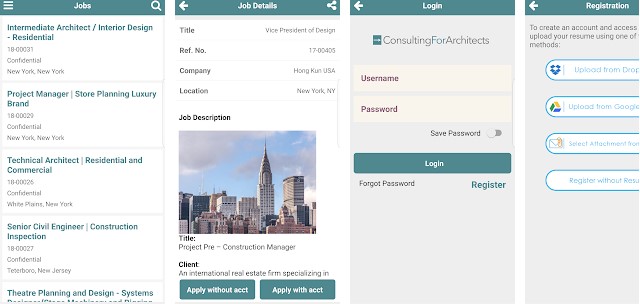
Whether you are in architecture or another industry, workers
today are finding advantages to switching jobs periodically rather than
remaining with the same company over a lifetime. From bigger paychecks to
higher positions, the benefits of mobility cannot be understated. However, the
way you move from one job to another speaks volumes about your professionalism
as well as your capacity for working well with others. Consider these five tips
to help you change architect positions without burning bridges.
The Time Factor
Giving notice is usually the first step toward moving up and
on. However, how you handle your notice will make a significant impact on how
your current employer views you once you are gone. While two weeks is the general
rule for resignations, you may need to give time depending on your specific
situation. The primary goal is to make the transition from you to your
replacement as smooth as possible without sticking around long enough to make
people feel awkward. When deviating from the two-week guideline, it is not
usually advisable to change that by more than a week either way.
It’s Not What You Know
You know the adage, “It’s not what you know, but who you
know.” Every architect position you hold gives you the opportunity to build
your professional network. You likely have some potentially valuable
connections at your current company, which may prove beneficial in the future.
Take the time to nurture those relationships before and after you switch
companies and be sure to keep your contact information current in case previous
contacts need to be in touch with you.
You Can’t Take it With You
Some things you should leave behind when you leave your
position, such as company data, clients and fellow employees. Soliciting
clients or employees is not an admirable practice and may be a violation of
your contract. Take steps to separate your personal information from the
company data file to avoid any suspicion of impropriety as you move to your
next architect position. An attitude of transparency will make the difference
in leaving your current employer on good terms.
Tie Up Loose Ends
At the same time, you also want to make sure you don’t leave
any loose ends as you walk out the door. Personal belongings should be taken
home with you as soon as you give notice. CNBC
recommends you transfer benefits like your 401k as well. You also want to arrange
to extend your healthcare benefits if your insurance coverage at your new
company does not become effective right away.
Interview at the End Like You Did at the Beginning
Many companies have an exit interview at the end of an
employee’s tenure. While this might seem like a tempting time to raise concerns
or voice complaints, it is always best to keep this meeting just as
professional and positive as your first interview was with the company. If you
do have issues to bring up, do so in a positive way – in the interest of
creating a better environment for your replacement and others.
Architecture Careers
|
Architect, architecture, architecture career, architecture jobs, architecture profession, Careers, Job Board, job hunting, Job Interviews, Job Search, jobs for architects
|

Female Architects by the Number
Winner of the Emerging Woman Architect of the Year Award 2014, Julia King talks about her work in both the UK and India
While women have forged a path in many male-dominated industries today, challenges still face female architects. As women are slowly moving into relevant positions and even leadership roles, there is still plenty of work to be done. Fortunately, awareness of inequality has been the first step in the creation of organizations and movements to support women passionate about the field. In addition, some outspoken architects are bringing the issue into focus, increasing awareness and encouraging women interested in studying architecture to pursue the profession as a legitimate career path.
While statistics offer hope that the presence of female architects are on the rise, the numbers also show there is more work to be done. According to a 2018 report in Artsy, women comprise approximately half of the students in architecture schools today. However, the numbers begin to decline dramatically as students move to the professional world, with women making up only 18% of licensed architects. Even more concerning is the fact that just three of the top 100 architecture firms are led by women.
When considering global numbers, the statistics start to
lean more in the favor of women in the industry. The National Council of Architectural
Registration Boards (NCARB) estimated in 2016 that women made up more than
one-third (36%) of all newly licensed architects. That number marks a small
increase from 2015, when 34% of new licenses went to women.
Issues Facing Women in the Industry
One of the biggest concerns female architects have today is inequality
when it comes to salary. A 2017 article in the journal Archipreneur
found that men earning $100,000 or more outpace women earning the same amount
by 7%. The difference exists even though more women than men have a four-year degree.
At the lower end of the salary scale, nearly twice as many women as men earn
less than $50,000.
The issues relating to salary inequalities was summed up in
part by a 2018 article in the New
York Times, titled, “Where are all the Female Architects?” The report noted
that pipeline is not a problem as it is in other industries, since plenty of
women are going to school to train for the profession. Instead, a generalized
negative perception of women in the profession could be at the root of the
difference. The New York Times reports that as recently as 2018, there were
assumptions that women would quit if they got married or had children, or that
they would not be able to lead with authority on job sites. Even their
creativity has been questioned at times in this male-dominated industry.
Growing Support Network
Fortunately, more women are becoming known in the industry
today, paving the way for other female architects to join the ranks. The New
York Times also reports that more women are getting appointed as deans or
directors at architecture programs at prestigious schools like Cornell,
Columbia, Princeton, and Yale. Female architects at the top of companies are
also gaining more recognition as trade journals and mainstream media are
highlighting these women.
Industry organizations are also beginning to make a place
for women – through conferences geared specifically to female architects or committees
designed to bring women in the profession together. The American
Institute of Architects (AIA) is hosting its first Women’s Leadership
Summit in September of this year, in an effort to bring together female
architects and those that have achieved leadership roles within their
organizations.
According to the AIA website, the goals of the Women’s
Leadership Summit are:
- Increase awareness of women in the industry
- Create a learning environment by combining women
at various stages of their careers
- Help women discover paths to leadership roles
- Provide the opportunity for women to learn from
one another
In addition, the AIA New York features a Women in
Architecture Committee to develop and promote women in the industry through
monthly meetings and other events. The local committee focuses on licensure,
mentorship and networking opportunities to help women take their careers in
architecture to the next level.
Pioneers Taking the “Female” Out of the Position
As more women take the stage in the architectural industry,
women following in their footsteps can find both inspiration and knowledge to
succeed in their careers. Dorte Mandrup, a Danish architect who is also the
creative director and founder at Dorte Mandrup, published an article in 2017,
which appeared in Politiken and Dezeen.
In the article, Mandrup makes the point that she does not
want to be referred to as a “female architect.” Instead, she wants to be known
as an architect – one whose work can compare with the creativity of any male
without having the additional label attached. She believes that until women
stop getting referred to as “female architects,” true equality within the
industry cannot happen.
Liz Ogbu trained as an architect at the Harvard Graduate
School of Design. However, she referred to herself in the New York Times
article as a “designer, social innovator, and urbanist.” Her point was that
women can make a name for themselves in the world of architecture to redefine success
within the industry. Instead of focusing solely on skyscrapers and museums, Ogbu
is focusing on designs for the underprivileged such as shelters for immigrant
day workers.
“In many ways, architecture is a profession that has been the
epitome of the dominant white patriarchy, from most of the celebrated
starchitects to the all too frequent obsession with buildings that are better
known for their beauty of the object rather than the quality of the life that
they enable…I’ve been committed to a design practice that is rooted in
elevating the stories of those who have most often been neglected or silenced.”
Whether you are looking for your very first position in the industry or
ready to take your career to the next level, we can help. We help architects,
interior designers and others in the building design profession find the job of
their dreams. Contact CFA
today to learn more.
Women in Architecture
|
aia awards, AIA Billing Index, aia firm survey, archipreneur, architecture, Architecture billings index, architecture careers, architecture programs, Compensation, cornell, David McFadden, deans, dorte mandrup, equal pay, femail architects, google blogs, harvard, ilookup, Job Search, julia king, leadership roles, learning environment, liz ogbu, maledominatedindustry, meninarchitecture, metorship, princeton, promote women, salary ineqquality, starchatect, trade jourmals, winneremergingwomanarchitect, women, women in architecture, Women in Architecture Committee, Women's Month, womensleadershipsummit, yale
|

JOB SEARCH
Download our mobile app. The mobile app is the fastest and most enjoyable way to search new job openings in architecture and interior design from the leading staffing and recruiting firm exclusive to the design community. Download app iPhone and Android
1. Install the CFA Job Search mobile app.
2. Create or import your resume
3. Swipe through jobs and apply!
Use this app to apply to jobs, manage your resume and other documents, and more – all directly from your smartphone using our mobile app. With the our mobile app you can:
* Search and apply for open positions. Find jobs and share your resume with only a few taps of your smartphone.
* Track your Applications.
* Store and manage your resumes. Upload your latest resume to the Job Search app and use it to apply for jobs with one tap.
* Fill out, electronically sign and submit On-Boarding documents.
* Submit feedback on Assignments. Communicate with our team without leaving the Job Search app.

CFA is the only placement firm built from scratch by a published designer educated and experienced in architecture. Our search techniques utilize that enhanced insight, which is why job seekers and hiring firms choose our top-tier staffing services.
Project Basis
Project-to-Perm Basis
Permanent Basis
Specializing on job openings in New York, Los Angeles, and Nationwide.
Download app
iPhone and Android
Google Play and Apple App Store
Job Hunting
|
American Institute of Architects, Android, Career Change, Consulting For Architects, David McFadden, Employment, Google, Google Play, iPhone, iStore, job hunting, Job Search, Mobile Apps, unemployed architects
|











